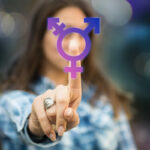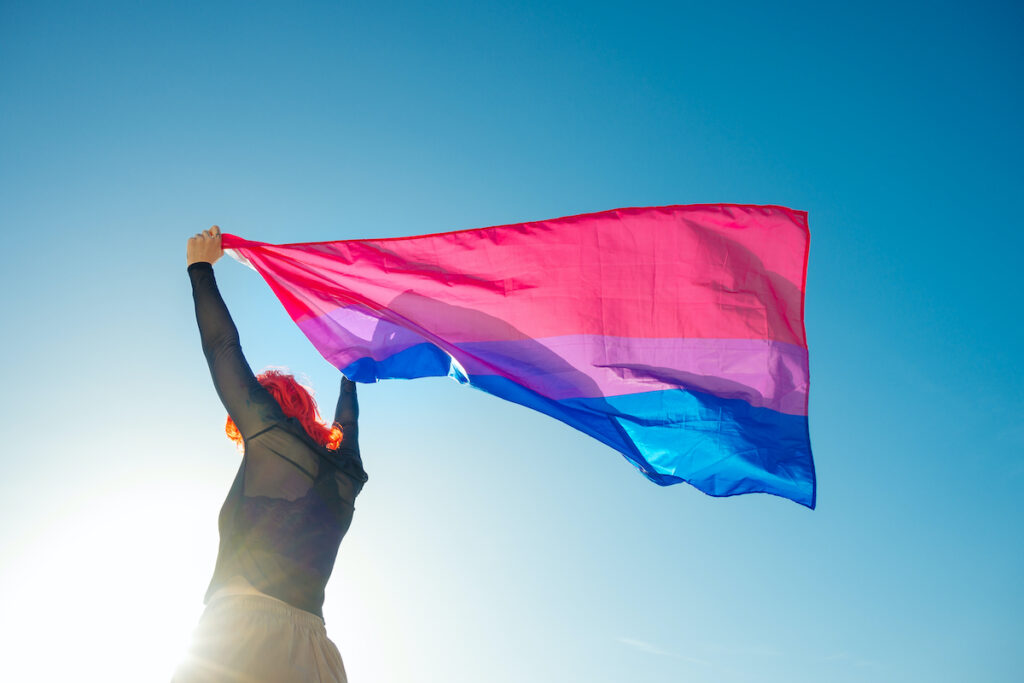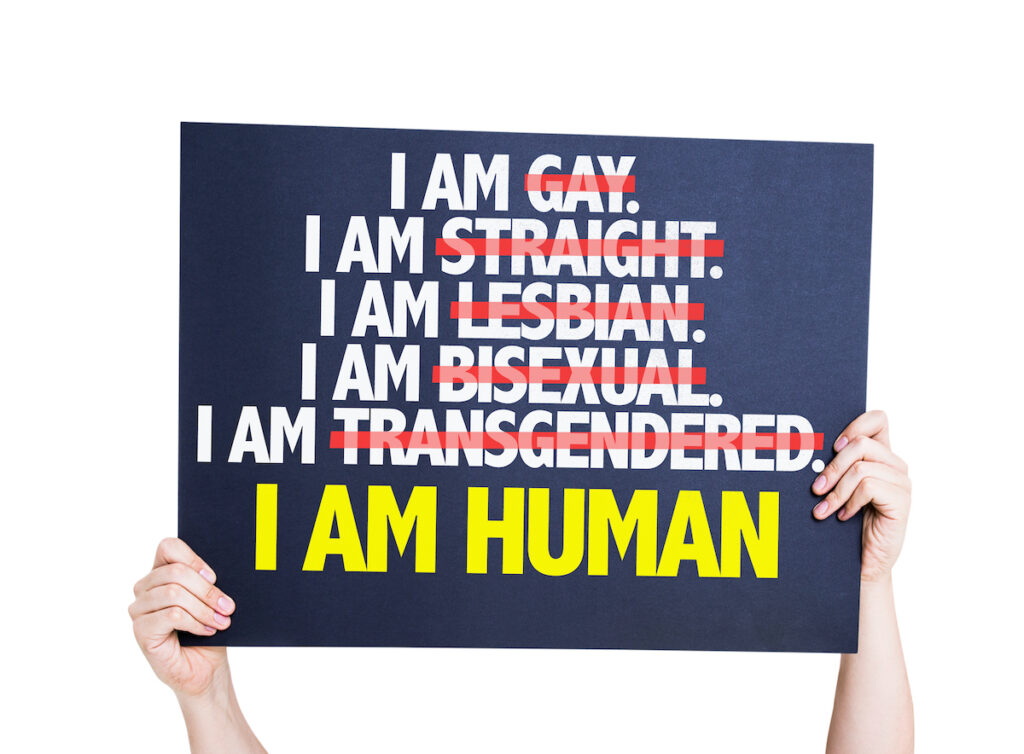
Bisexual individuals are those attracted to people of more than one gender/sex. Of all the sexual orientations, bisexual people experience the worse mental health outcomes (Salway et al., 2019). This is largely due to them facing discrimination from both heterosexual and homosexual people, which can weaken their ability to access supportive communities (Sarno et al., 2020). Examples of negative attitudes towards bisexual people include stereotypes about them being confused.
Recently, focus has been placed on understanding the experience of bisexual identity invalidation amongst bisexual individuals, which is when people deny or refuse to accept a person’s identity (Franco & O’Brien, 2018). For example, bisexual people have described experiences where they must justify their sexual orientation (Flanders et al., 2016). Previous research has shown that identity invalidation leads to identity instability, confusion, and lack of sense of belonging (Franco et al., 2016).
A recent qualitative study aimed to further understand how identity invalidation manifests in bisexual peoples’ lives and how it impacts their wellbeing and relationships.

Identity invalidation is a predominant stressor experienced by bisexual individuals which can result in negative consequences, including lack of sense of belonging.
Methods
52 bisexual participants completed an online survey which comprised a demographics questionnaire and a prompt about identity invalidation. Subsequently, a series of open-ended questions were presented asking participants to describe their experience and its impact on them.
Three coders analysed the answers using a consensual qualitative research approach (Hill et al., 1997). First domains were created through chunking the answers into sections, then core ideas were created through describing the answers in concise abstracts, followed by analysing core ideas to create subthemes within each domain.
A list of overlapping categories within a domain was developed by analysing similarities across core ideas. Two independent auditors offered suggestions for redefining domains.
Coders also reflected on their positionality and interpretations of the answers to address likely influence on the analysis.
Results
Of the 52 participants, all of them were United States residents, 76.9% were white and the average age was 30.3 years. Further, 80.8% identified as bisexual, whereas 13.5% were pansexual and 5.7% had other identity labels (e.g. queer). 67.3% and 25% were cis-gender women and men, respectively, whereas the rest identified as transgender or non-binary.
Majority of the participants reported that the main perpetrators of identity invalidation were family members and friends. Participants also reported reasons why they believed people invalidated their identity:
1. Lack of understanding and acceptance
Participants believed others had a lack of accurate knowledge about bisexuality. For example, they spoke of moments when they were accused of lying due to individuals preconceived notions that people can only be ‘gay’ or ‘straight’. One participant recalled a moment with her mother:
She kept thinking I was a lesbian and couldn’t understand that I was attracted to both females and males.
2. Partner gender
Another common theme was about the gender of the participants’ romantic partner not meeting the perception of who they believed they should be dating. For instance, one woman participant spoke of being invalidated due to being in a relationship with a man:
I am committed to a man for the rest of my life, so I am frequently told that I’m not bi.
3. Confusion
Many reported experiences of others believing they were ‘confused’. This is illustrated in the quote below:
She thought I was just curious about women and not actually interested in them.
4. Faking bisexual identities
Participants recalled times when individuals thought they were attention seeking. One participant said:
My mother told me it was just a phase.
5. Religious beliefs
Participants reflected on moments when others invalidated their identity due to religious beliefs. For example:
She told me that my beliefs were demonic and that I needed to go to church.
Participants spoke about how these reactions made them feel anger, frustration, and sadness. Further, some participants said it made them feel hostile, confused, and secretive about their sexuality, whereas others disclosed not allowing invalidation to negatively affect their sense of self. Lastly, participants discussed their perceptions of how identity invalidation impacted their relationships. Common themes included trust issues and distancing themselves from the perpetrator.

Participants identified various reasons why bisexual identity invalidation occurs, such as lack of understanding, inaccurate perceptions of who they should be dating, that they are confused and religious beliefs.
Conclusions
Findings highlight that bisexual identity invalidation is a common experience among bisexual people. Identity invalidation can lead to strained relationships between the bisexual individual and the invalidation perpetrator. This research is in line with the minority stress theory, which suggests that invalidation contributes to bisexual peoples’ psychological distress and social isolation (Meyer, 2003).

Identity invalidation experienced by bisexual individuals can lead to a sense of alienation which feeds into feelings of distress.
Strengths and limitations
This study has notable positives:
- A noteworthy strength of this study is researchers bringing awareness to a highly under-researched stressor experienced by bisexual individuals. By providing insight into misunderstandings about bisexuality, findings from this study can assist in dismantling mono-sexism; the belief that heterosexuality/homosexuality is more legitimate than bi+ identities. Further, this paper highlights how we can attend to bisexual people’s specific type of marginalisation.
- Ten transcripts were excluded from initial analyses and were explored following the analyses of the rest of the transcripts. As no new themes were identified in the analysis of these ten transcripts, it confirms that the themes captured initially were truly representative of participants’ perceptions.
- The present study recruited 52 participants compared to 8-15 participants usually recruited when using a consensual qualitative research approach. Considering that participants’ experiences were categorised as a common theme only when it was disclosed by at least five people, it ensured that data collected was thematic rather than idiosyncratic.
- Researchers reflected on how their perceptions may have influenced the interpretation of answers. This ensured transparency in the interpretation of the results.
There are also some limitations:
- Despite participants sharing distressing experiences, there was no information on whether researchers addressed potential effects of the study on the participants’ well-being.
- Considering that participants were all US residents with the majority identifying as ‘White’, the current findings may not be generalisable to people of different demographic characteristics.

Researchers have brought awareness to a neglected area of research which can help in tackling discrimination against bisexual individuals.
Implications for practice
Identity invalidation could be an important intervention target to reduce the mental health disparities affecting bisexual people.
In moments where bisexual individuals are experiencing significant psychological distress, practitioners could explore the possibility of how this stressor may be contributing to such feelings. Therefore, knowledge of this stressor can result in richer formulation carried out by practitioners.
Cultivate more affirming environments for bisexual people; namely, by validating their identities. It is important to address misconceptions about sexual orientations through educating people about bisexual identities both within and outside of the LGBTQ+ communities. This is imperative as it could reduce the occurrence of identity invalidation and thus, contribute positively to bisexual individual’s mental wellbeing.
Clinicians may benefit from talking about family of origin issues with clients in light of how they perceive bisexuality, and this might be impacting the person’s wellbeing. It is also prudent to discuss how family members of bisexual individuals can help foster a more positive environment.
Clinicians should recognise the importance of assessing and discussing the role identity may play in bisexual individuals’ relationships. This could help bisexual individuals live fuller lives and have better relationships.

Clinicians should be aware of the importance of facilitating positive bisexual identities and try to cultivate more affirming therapeutic environments for this group by validating their sexual identities.
Statement of interests
None.
Links
Primary paper
Feinstein, B. A., Franco, M., Henderson, R., Collins, L. K., & Davari, J. (2019). A qualitative examination of bisexual+ identity invalidation and its consequences for wellbeing, identity, and relationships. Journal of Bisexuality, 19(4), 461-482.
Other references
Flanders, C. E., Robinson, M., Legge, M. M., & Tarasoff, L. A. (2016). Negative identity experiences of bisexual and other non-monosexual people: A qualitative report. Journal of Gay & Lesbian Mental Health, 20(2), 152-172.
Franco, M. G., Katz, R., & O’Brien, K. M. (2016). Forbidden identities: A qualitative examination of racial identity invalidation for Black/White Biracial individuals. International Journal of Intercultural Relations, 50, 96-109.
Franco, M. G., & O’Brien, K. M. (2018). Racial identity invalidation with multiracial individuals: An instrument development study. Cultural Diversity and Ethnic Minority Psychology, 24(1), 112.
Hill, C. E., Lent, R. W., Morrison, M. A., Pinto-Coelho, K., Jackson, J. L., & Kivlighan Jr, D. M. (2016). Contribution of supervisor interventions to client change: The therapist perspective. The Clinical Supervisor, 35(2), 227-248.
Meyer, I. H. (2003). Prejudice, social stress, and mental health in lesbian, gay, and bisexual populations: conceptual issues and research evidence. Psychological bulletin, 129(5), 674.
Salway, T., Ross, L. E., Fehr, C. P., Burley, J., Asadi, S., Hawkins, B., & Tarasoff, L. A. (2019). A systematic review and meta-analysis of disparities in the prevalence of suicide ideation and attempt among bisexual populations.Archives of Sexual Behavior, 48(1), 89-111.
Sarno, E. L., Newcomb, M. E., Feinstein, B. A., & Mustanski, B. (2020). Bisexual men’s experiences with discrimination, internalized binegativity, and identity affirmation: Differences by partner gender. Archives of sexual behavior, 49, 1783-1798.
